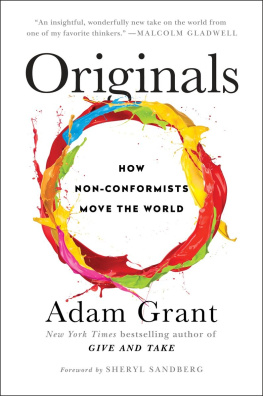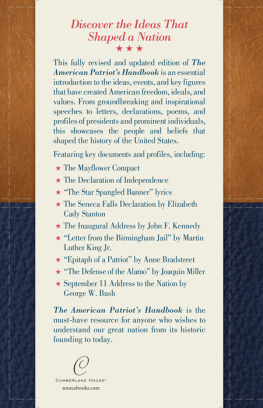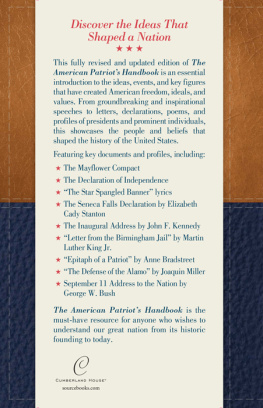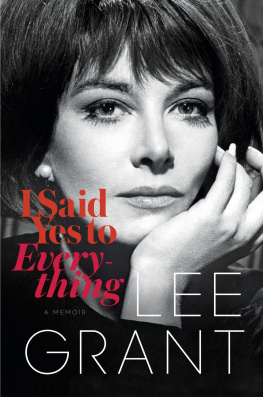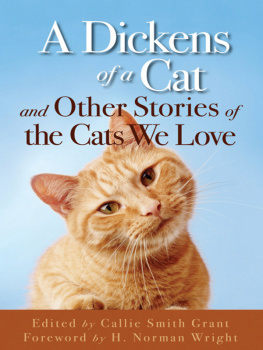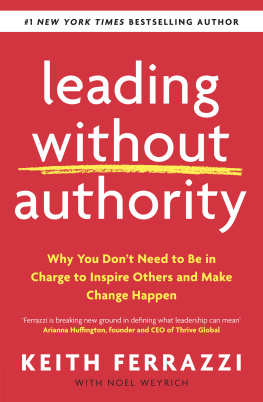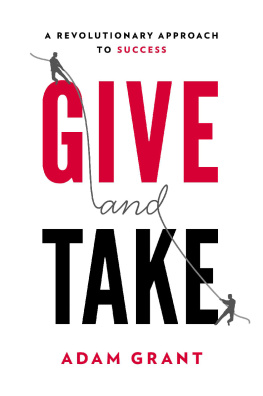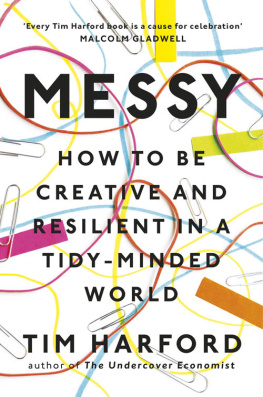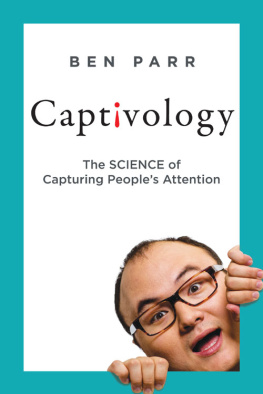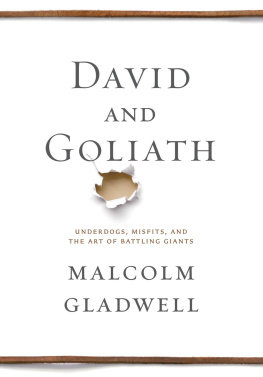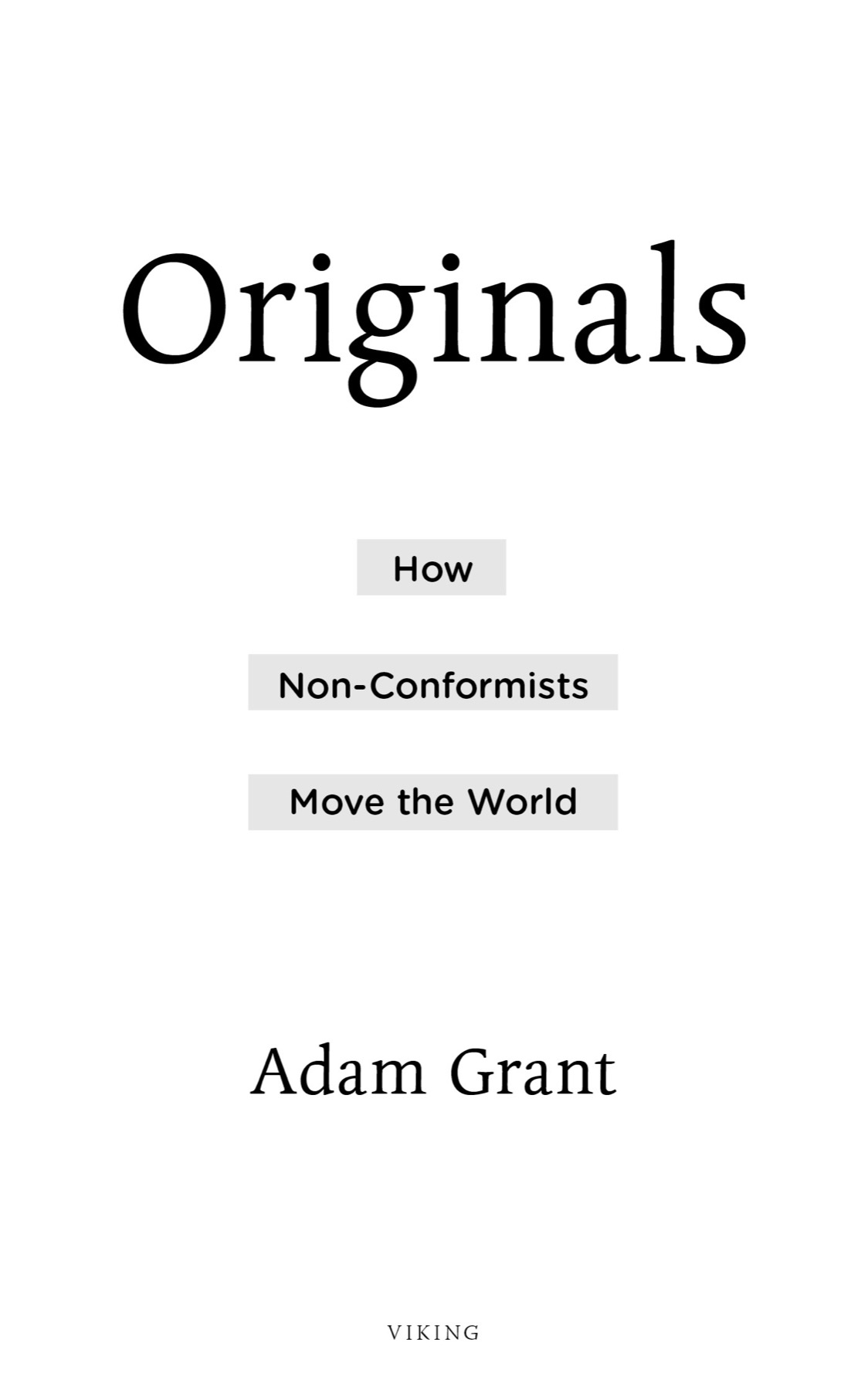Penguin supports copyright. Copyright fuels creativity, encourages diverse voices, promotes free speech, and creates a vibrant culture. Thank you for buying an authorized edition of this book and for complying with copyright laws by not reproducing, scanning, or distributing any part of it in any form without permission. You are supporting writers and allowing Penguin to continue to publish books for every reader.
Foreword
BY SHERYL SANDBERG
Chief operating officer of Facebook and founder of LeanIn.Org
A dam Grant is the perfect person to write Originals because he is one.
He is a brilliant researcher who passionately pursues the science of what motivates people, busting myths and revealing truths. He is an informed optimist who offers insights and advice about how anyoneat home, at work, in the communitycan make the world a better place. He is a dedicated friend who inspires me to believe in myself and has helped me understand how I can advocate effectively for my ideas.
Adam is one of the most important influences in my life. Through the pages of this magnificent book, he will enlighten, inspire, and support you as well.
M YTH B USTER
Conventional wisdom holds that some people are innately creative, while most have few original thoughts. Some people are born to be leaders, and the rest are followers. Some people can have real impact, but the majority cant.
In Originals Adam shatters all of these assumptions.
He demonstrates that any of us can enhance our creativity. He reveals how we can identify ideas that are truly original and predict which ones will work. He tells us when to trust our gut and when to rely on others. He shows how we can become better parents by nurturing originality in our children and better managers by fostering diversity of thought instead of conformity.
In these pages, I learned that great creators dont necessarily have the deepest expertise but rather seek out the broadest perspectives. I saw how success is not usually attained by being ahead of everyone else but by waiting patiently for the right time to act. And to my utter shock, I learned that procrastinating can be good. Anyone who has ever worked with me knows how much I hate leaving things to the last minute, how I always think that anything that can be done should be done right away. Mark Zuckerberg, along with many others, will be pleased if I can let go of the relentless pressure I feel to finish everything earlyand, as Adam points out, it might just help me and my teams achieve better results.
I NFORMED O PTI MIST
Every day, we all encounter things we love and things that need to change. The former give us joy. The latter fuel our desire to make the world differentideally better than the way we found it. But trying to change deep-seated beliefs and behaviors is daunting. We accept the status quo because effecting real change seems impossible. Still, we dare to ask: Can one individual make a difference? And, in our bravest moments: Could that one individual be me?
Adams answer is a resounding yes. This book proves that any one of us can champion ideas that improve the world around us.
F RIEND
I met Adam just as his first book, Give and Take, was generating buzz in Silicon Valley. I read it and immediately started quoting it to anyone who would listen. Adam was not only a talented researcher but also a gifted teacher and storyteller who was able to explain complicated ideas simply and clearly.
Then my husband invited Adam to speak to his team at work and brought him over for dinner. Adam was every bit as extraordinary in person as he was on paper. His knowledge was encyclopedic and his energy was contagious. He and I started talking about how his research could inform the debate on gender and began working together. We have done so ever since, conducting research and writing a series of op-eds about women and work. LeanIn.Org has benefited immensely from his rigorous analysis and commitment to equality.
Once a year, Facebook brings its global teams together, and in 2015 I invited Adam to give a keynote speech. Everyone was blown away by his wisdom and humor. Months later, the teams are still talking about his insights and putting his advice into action.
Along the way, Adam and I became friends. When tragedy hit and I lost my husband suddenly, Adam stepped up and stepped in as only a true friend would. He approached the worst time of my life as he approaches everything, combining his unique understanding of psychology with his unparalleled generosity. When I thought I would never feel better, he flew across the country to explain what I could do to build my resilience. When I could not figure out how to handle a particularly gut-wrenching situation, he helped me find answers where I thought there were none. When I needed a shoulder to cry on, his was always there.
In the deepest sense of the word, a friend is someone who sees more potential in you than you see in yourself, someone who helps you become the best version of yourself. The magic of this book is that Adam becomes that kind of friend to everyone who reads it. He offers a wealth of advice for overcoming doubt and fear, speaking up and pitching ideas, and finding allies in the least likely of places. He gives practical guidance on how to manage anxiety, channel anger, find the strength in our weaknesses, overcome obstacles, and give hope to others.
Originals is one of the most important and captivating books I have ever read, full of surprising and powerful ideas. It will not only change the way you see the world; it might just change the way you live your life. And it could very well inspire you to change your world.
1
Creative Destruction
The Risky Business of Going Against the Grain
The reasonable man adapts himself to the world; the unreasonable one persists in trying to adapt the world to himself. Therefore all progress depends on the unreasonable man.
George Bernard Shaw
O n a cool fall evening in 2008, four students set out to revolutionize an industry. Buried in loans, they had lost and broken eyeglasses and were outraged at how much it cost to replace them. One of them had been wearing the same damaged pair for five years: He was using a paper clip to bind the frames together. Even after his prescription changed twice, he refused to pay for pricey new lenses.
Luxottica, the 800-pound gorilla of the industry, controlled more than 80 percent of the eyewear market. To make glasses more affordable, the students would need to topple a giant. Having recently watched Zappos transform footwear by selling shoes online, they wondered if they could do the same with eyewear.
When they casually mentioned their idea to friends, time and again they were blasted with scorching criticism. No one would ever buy glasses over the internet, their friends insisted. People had to try them on first. Sure, Zappos had pulled the concept off with shoes, but there was a reason it hadnt happened with eyewear. If this were a good idea, they heard repeatedly, someone would have done it already.

